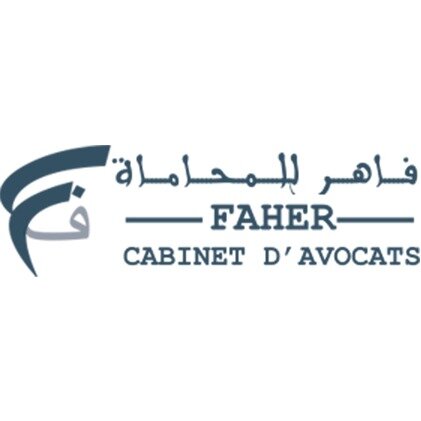Best Hiring & Firing Lawyers in Morocco
Share your needs with us, get contacted by law firms.
Free. Takes 2 min.
Or refine your search by selecting a city:
List of the best lawyers in Morocco
About Hiring & Firing Law in Morocco
Hiring and firing practices in Morocco are governed by a combination of the Moroccan Labor Code and other legal frameworks that aim to balance the interests of employers and employees. The Labor Code outlines the legal requirements for employment contracts, employee rights, employer obligations, and the procedures that must be followed when hiring or terminating employment. These laws are designed to ensure fairness and prevent unjust treatment in the workplace.
Why You May Need a Lawyer
There are several common situations where individuals or companies might require legal assistance in the realm of hiring and firing in Morocco:
- Understanding complex employment contracts and agreements.
- Resolving disputes related to wrongful termination or unfair dismissal.
- Navigating redundancy procedures and layoffs.
- Ensuring compliance with local labor laws and regulations.
- Handling negotiations for severance packages or settlement agreements.
- Dealing with allegations of workplace discrimination or harassment.
Legal expertise can be crucial in these situations to protect your rights and interests, and to ensure compliance with applicable laws.
Local Laws Overview
Some of the key aspects of the local laws regarding hiring and firing in Morocco include:
- Employment Contracts: Must be clearly defined and can be either fixed-term or indefinite. They must detail the terms of employment, job duties, salary, and other essential conditions.
- Termination: Employers must have just cause for terminating employment and must adhere to specific procedures outlined in the Labor Code, including notice periods and, where applicable, severance pay.
- Employee Rights: Employees are entitled to various rights including a minimum wage, annual leave, sick leave, and safe working conditions.
- Workplace Discrimination: Discrimination based on race, gender, disability, and other protected characteristics is prohibited.
- Labor Disputes: Disputes may be resolved through mediation, arbitration, or through the Labor Courts.
Understanding these laws is essential not only for adhering to legal requirements but also for fostering a fair and equitable workplace environment.
Frequently Asked Questions
What are my rights if I am terminated without cause?
If you are terminated without cause, you may be entitled to compensation as stipulated by the Labor Code, which can include severance pay and pay-in-lieu-of-notice. It is advisable to consult a lawyer to understand your specific rights based on your contract and circumstances.
How much notice is required before dismissing an employee?
The required notice period depends on the length of service and the terms outlined in the employment contract. Typically, it ranges from one month to three months.
Can employers impose probation periods on new hires?
Yes, employers can impose probation periods on new hires, but the duration and conditions must be defined in the employment contract. Generally, probation periods can last between three to six months.
Is there a minimum wage in Morocco?
Yes, Morocco has a legally mandated minimum wage, which is periodically updated. Employers must adhere to this standard to comply with labor laws.
What constitutes wrongful termination?
Wrongful termination in Morocco involves dismissing an employee without just cause or failing to follow due process as outlined in the Labor Code.
How can employment disputes be resolved?
Disputes may be resolved through mediation, arbitration, or brought before the Labor Courts. Legal counsel can help determine the best course of action depending on the situation.
Are there protections against workplace discrimination?
Yes, Moroccan labor laws prohibit discrimination based on gender, race, disability, and other protected characteristics, ensuring fair treatment for all employees.
What is the standard workweek in Morocco?
The standard workweek typically consists of 44 hours, spread over six days. Adjustments can be made via agreement between employers and employees.
Can employees resign without notice?
While it is preferable to give notice according to the terms of the employment contract, employees can resign without notice in certain situations, such as cases of employer misconduct or unsafe working conditions.
Are severance packages mandatory?
Severance packages are typically mandated in cases of redundancy or dismissal without sufficient cause. The specifics will depend on the duration of employment and terms in the employment contract.
Additional Resources
For those seeking further information or assistance, consider the following resources:
- Moroccan Ministry of Employment and Professional Integration.
- Local labor unions, which can provide guidance and support.
- Legal aid organizations that offer support for employment issues.
- The Moroccan Labor Courts, for official disputes and resolutions.
Next Steps
If you find yourself needing legal assistance for hiring or firing matters, consider taking these steps:
- Consult with a qualified labor law attorney to assess your situation and provide tailored advice.
- Gather any relevant documentation, such as employment contracts, termination letters, and email correspondence.
- Engage in open communication with the other party to explore the possibility of an amicable resolution.
- Consider reaching out to one of the recommended resources for additional support and guidance.
Proceeding with professional legal counsel can provide clarity and help protect your rights under Moroccan law.
Lawzana helps you find the best lawyers and law firms in Morocco through a curated and pre-screened list of qualified legal professionals. Our platform offers rankings and detailed profiles of attorneys and law firms, allowing you to compare based on practice areas, including Hiring & Firing, experience, and client feedback.
Each profile includes a description of the firm's areas of practice, client reviews, team members and partners, year of establishment, spoken languages, office locations, contact information, social media presence, and any published articles or resources. Most firms on our platform speak English and are experienced in both local and international legal matters.
Get a quote from top-rated law firms in Morocco — quickly, securely, and without unnecessary hassle.
Disclaimer:
The information provided on this page is for general informational purposes only and does not constitute legal advice. While we strive to ensure the accuracy and relevance of the content, legal information may change over time, and interpretations of the law can vary. You should always consult with a qualified legal professional for advice specific to your situation.
We disclaim all liability for actions taken or not taken based on the content of this page. If you believe any information is incorrect or outdated, please contact us, and we will review and update it where appropriate.
Browse hiring & firing law firms by city in Morocco
Refine your search by selecting a city.

















